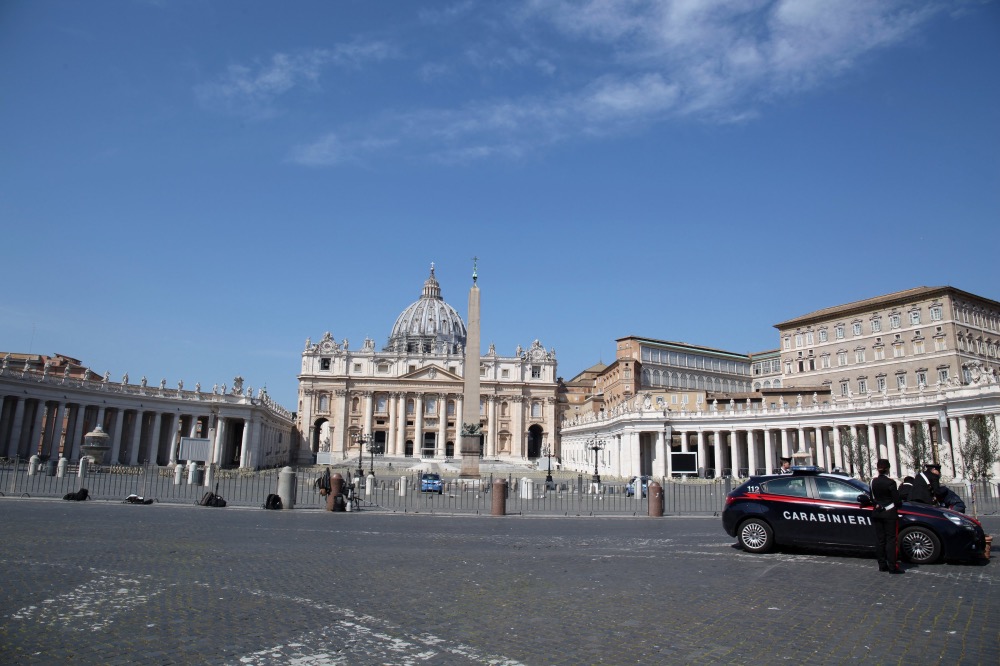Vatican City
RNS
Six months into 2020, nations around the world are already floundering to salvage their crippled economies.
The Vatican is no exception.

St Peter’s Square is closed in Vatican City on Palm on Sunday, 5th April in Rome. PICTURE: Claire Giangravé/RNS/File photo.
Travel bans and lockdown in Italy have shut down the usual robust tourist trade. The Vatican’s world-renowned museums, which usually draw tens of thousands of people a day and generate millions of dollars in revenue, remain mostly empty.
The financial blow dealt by the pandemic has put a dent in charitable donations.
All told, revenue at the Vatican will likely be down between 25 and 45 per cent this year, according to Rev Juan Antonio Guerrero Alves, head of the prefect of the Secretariat for the Economy.
All of which adds pressure to Pope Francis’ attempts to reform the Vatican’s finances.
In June, the Pope released new guidelines to streamline how the Vatican and its bureaucratic departments spend their now reduced finances for goods and services.
The document sets clear procedures for Vatican departments to follow when it comes to expenditures.
The keyword in the documents is “centralisation”, said Vincenzo Bassi, vice president of the Catholic jurist union in Italy, during an interview on Monday, 29th June with Religion News Service.
With the new measures, the Governorate and the Administration of the Patrimony of the Holy See, or APSA, must approve any purchase of goods or services at the Vatican through a carefully selected list of vendors.
If a Vatican department wishes to acquire goods and services, it must send a proposal to APSA or the Governorate for approval. Only if approved can other departments go ahead with the deal, which must follow transparency and sustainability standards.
“The general rule is to centralize the purchase of goods and services,” Bassi said.
He added that the document does allow Vatican departments to exercise their autonomy if they follow the rules.
The document issued by Pope Francis is designed to “guide a process of economic efficiency and sustainability”, Bassi said.
But the guidelines won’t work if Vatican officials and employees don’t embrace them.
“A law doesn’t enforce justice,” Bassi said. “It’s up to the will of the people. In this case, we are referring to the functionaries of the Holy See, who will have to put it in practice according to the criteria of justice.”
The Vatican City State Tribunal will be responsible for upholding the new norms, according to the document.
However, the new rules have what could be a fatal flaw.
Bishops and cardinals will not be held accountable if they flout the new rules, said Bassi. If one of them breaks the rules, that individual cannot be charged under the Vatican’s laws, he said.
Instead, the individual’s entire department has to answer to the tribunal if the deals go astray.
“A cardinal will never be on trial. That could never happen as a result of this law,” he said.
Instead, he believes the new rules will “help cardinals” by giving them a very strict procedure to follow and reducing the alternative options.
In the past, critics of the Vatican’s troubled financial operations have called for involving more laypeople who have business expertise. That approach has been tried with mixed results.
The former auditor general, layman Libero Milone, was ousted unceremoniously in 2017. The same year, Giulio Mattietti, the number two of the Vatican bank (officially named the Institute for Religious Works) was escorted outside the walled city by Swiss Guards.
A lay official of the Catholic Bambino Gesù hospital was tried and charged by a Vatican tribunal in 2017 for embezzling funds for the refurbishment of the apartment of Cardinal Tarcisio Bertone. While the hearings strongly implied the cardinal’s hands-on role in the deal, Bertone was never even called to testify at the trial.
A recent financial scandal revolving around a prime real estate deal in London, which cost the Vatican over $US200 million in fees, highlighted the involvement of several laymen. The deal went sour and the Vatican arrested one of the lay brokers in the deal, Gianluigi Torzi, for 10 days in mid-June.
“I think there are many laypeople at the Vatican, and given recent history, maybe there are enough,” said Bassi.
Instead, he believes that any successful reform has to involve culture change that embraces transparency and efficiency.
“What’s more important in this reform is for everyone to be a part of the same worldview,” Bassi said.






